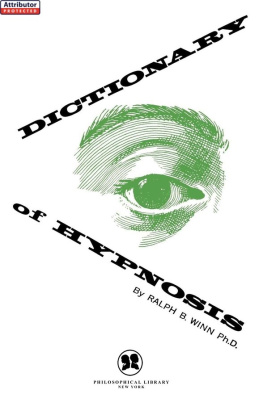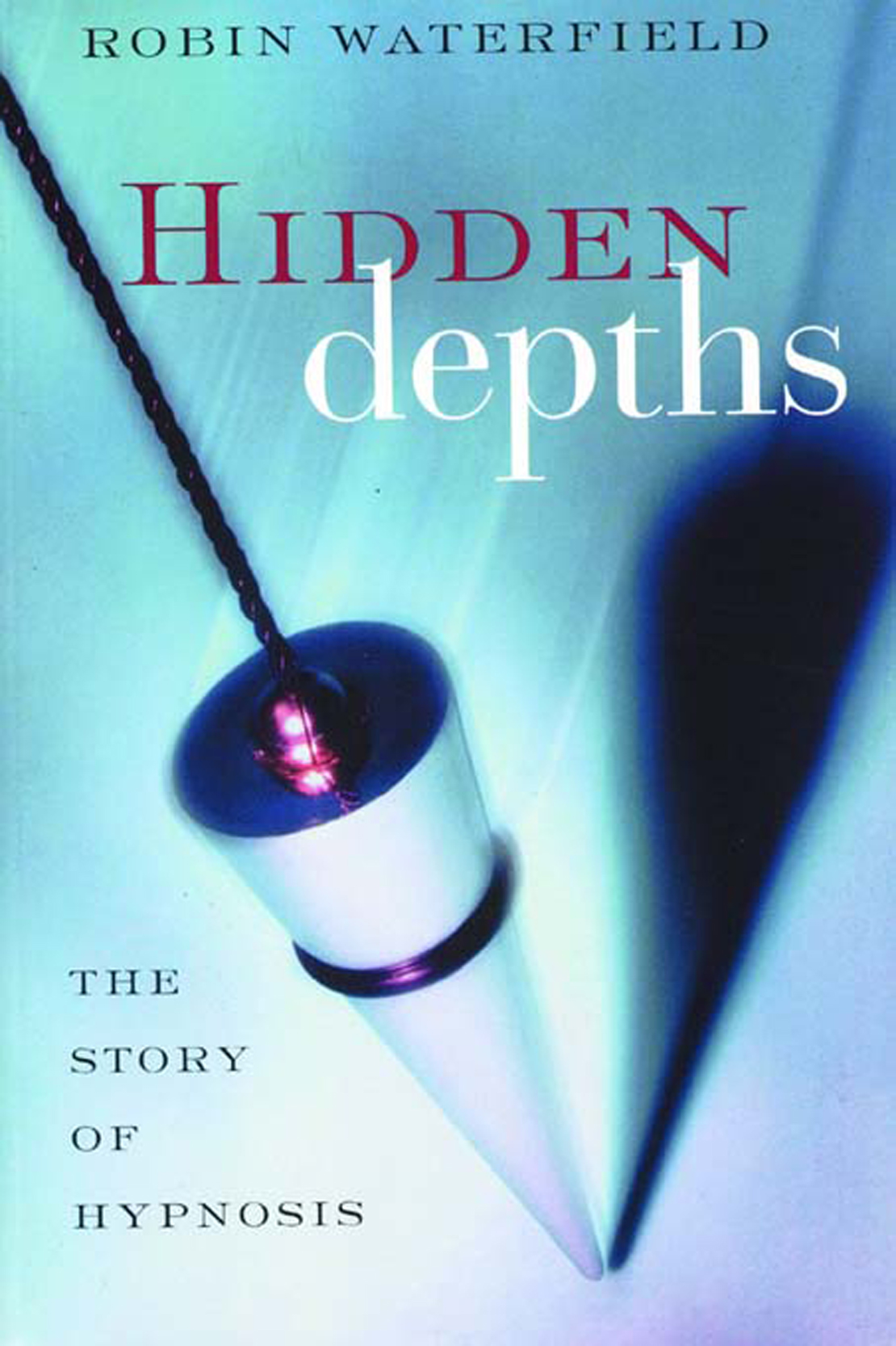HIDDEN DEPTHS
Robin Waterfield
HIDDEN DEPTHS
The Story of Hypnosis
MACMILLAN
Published in 2003 by
Brunner-Routledge
29 West 35th Street
New York, NY 10001
www.brunner-routledge.com
Copyright 2002 by Robin Waterfield
First published in the United Kingdom in hardback by Macmillan, an imprint of Pan Macmillan Ltd.
Cover design: Pearl Chang
Cover photo: Pendulum Corbis
Brunner-Routledge is an imprint of the Taylor & Francis Group.
Printed in the United States of America on acid-free paper.
All rights reserved. No part of this book may be reprinted or reproduced or utilized in any form or by any electronic, mechanical, or other means, now known or hereafter invented, including photocopying and recording, or in any information storage or retrieval system, without permission in writing from the publishers.
10 9 8 7 6 5 4 3 2 1
Library of Congress Cataloging-in-Publication Data
Waterfield, Robin, 1952
Hidden depths : the story of hypnosis / Robin Waterfield.
p. cm.
Previously published: London : Macmillan, 2002.
Includes bibliographical references and index.
ISBN 041594791X (hb) 0415947928 (pb)
1. HypnotismHistory. I. Title.
RC495.W345 2003
154.709dc21
2003011033
To my karass
Code the world with the fugitive light
Animal magnetism is the most significant discovery ever made, even if, for the time being, it brings more enigmas than it solves
Arthur Schopenhauer, Smmtliche Werke IV
Mesmerism is too gross a humbug to admit any farther serious notice. We regard its abettors as quacks and impostors. They ought to be hooted out of professional society
Thomas Wakley, first editor of the Lancet
All sciences alike have descended from magic and superstition, but none has been so slow as hypnosis in shaking off the evil associations of its origin
Clark Hull, Hypnosis and Suggestibility
Contents
List of Illustrations
Every effort has been made to contact copyright holders of pictures reproduced in this book. If any have been inadvertently overlooked, the publishers will be pleased to make restitution at the earliest opportunity.
Acknowledgements
As usual, I have incurred many debts in the course of writing this book. Above all, I must acknowledge Rupert Heath and Peter Marshall, who between them were the prime movers of the project. This is very much my Cornish book, mostly written during a glorious two-year sojourn on the Lizard Peninsula; but it is hard to know who or what to thank (apart from my parents for their great generosity) when love of a place has been for so long so deeply rooted in one's being. In London, Jeremy Trevathan has been a warm and encouraging editor, and Tony Bickford deserves the title patron of the arts. Tom Bell is a paradigm of the doctors of the future, who will include hypnosis in their arsenal; he was extremely generous with his time and advice. It is a pleasure to acknowledge the help of my bibliophile friend Robert Temple, who let me browse through his wonderful collection of nineteenth-century works on hypnosis. Thanks as always to Richard Leigh, for his constant willingness to share his enormous knowledge of fine literature. Simon Anderson-Jones and Charles Drazin pointed me in the direction of a number of films, and Simon lent me a whole stack of them too. Brian Lancaster was a superb professional reader and made many valuable suggestions. Melvin Gravitz and David Spiegel kindly sent me offprints of articles (accompanied by recommendations for further reading in David's case), and Megan Kerr tracked down some American court cases. My thanks to Bernard Carr for steering me towards the library of the Society for Psychical Research. Not all those I interviewed could be named, but I owe thanks for their time to Ron Alexander (Sleepy Sam), Tom Bell, Sally Gilbert and Dennis Moore. Then there are debts for board and lodging during my research trips to London and in the States: here I must mention Martin Buckley and Penny Lawrence, Stela Tomasevic and Jurgen Quick, Rod Thorn, and especially Michael Brown and Sylvia Kennick Brown not forgetting Emily Cheng Li. Family debts are of course too many to list; in this case they range from my son Julian, for his knowledge of Hebrew, to my partner Ingrid Gottschalk, for depth of emotion and breadth of physical space.
Preface
It is 1784. You are in a dimly lit salon in a mansion in a prosperous section of Paris. The room is presided over by a tall, slightly overweight man dressed in a purple cloak trimmed with lace and embroidered with occult symbols. Other sigils decorate the walls and heavy velvet curtains cover the windows, allowing just the odd ray of sunlight in to strike the thickly carpeted floor, and hardly a sound penetrates from the street outside. Melodious piano music can be heard softly from another room. You and a number of other Parisians are seated around a large, low tub, and there are other such tubs in the room, three for the rich and one for the poor. However, there are few poor people at their tub, since it is fashionable Paris that is fascinated by this new science. Movable iron rods stick out through the cover of the tub and have been bent at right angles, so that from where you sit on chairs around the tub you and the others can hold the rods, or apply them directly or by means of an attached rope to an afflicted part of the body. The other end of these rods, you have been informed, are resting in phials of magnetized water, and these phials in turn stand in a pool of water containing magnetized iron filings. The wizard, who is none other than Franz Anton Mesmer, calls this contraption a baquet (which just means tub), and explains that it, or the attentions of an individual healer such as himself, can restore the lost balance of the magnetic fluid which pervades the universe and animates all living creatures, and whose disturbance is ill health. The group of clients grasp the rods and wait in silence. The atmosphere in the room grows very intense. Occasionally Mesmer or one of his assistants prowls around the room. To complete his appearance as a wizard, Mesmer carries a wand, with a metal tip. He inspects the woman next to you, passes his hands behind her back without touching her, points the wand at her, and she goes into convulsions. Her body begins to jerk, and her breathing is shallow and uneven; a flush comes over her face and neck. Finally she collapses gently to the floor, coughing up phlegm. Assistants calmly come and take her away to another room, which you can see is lined with mattresses and soft silk drapes. Mesmer follows to attend to her, now that she is on the road to health.
*
It is 1850. You are in the comfortable and cluttered drawing room of a well-to-do self-styled doctor. He sits you down in a straight-backed chair, and pulls up another chair opposite you. If you are a woman, you are chaperoned, and he delicately places your knees to one side of his; if you are a man he sits with his knees between yours. He feels rather too close for comfort, but you are here of your own free will to be mesmerized, and so you submit. He asks you gently to relax, and tells you that you have nothing to fear. Then silence falls. He makes a few sample passes over your hands, from the wrist to the fingertips, drawing his hands close to the skin, so close that you can feel the warmth of his hand, but never quite touching. To your surprise after a while you feel a faint coolness and tingling. Satisfied, he then proceeds to take your right hand in his left hand, and your left hand in his right hand, in a special grip that involves pinching the balls of your thumbs, and he asks you to stare intently at one of his eyes. He returns your gaze without blinking for some minutes; you can feel him exerting his will to some end which is mysterious to you. You begin to feel a strange sensation of heaviness and drowsiness. Without speaking a word, he begins to make passes with his hands over your forehead and eyes and down to your neck. Your eyelids begin to feel very heavy and that is the last you remember clearly for a while.










